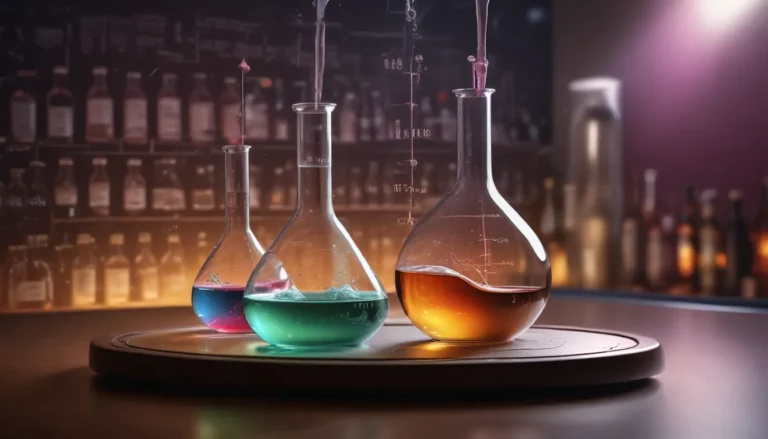A Note About Images: The images used in our articles are for illustration purposes only and may not exactly match the content. They are meant to engage readers, but the text should be relied upon for accurate information.
Toxicology is a captivating field that delves deep into the study of poisons, their impact on living organisms, and the mechanisms by which they exert their harmful effects. It combines elements of chemistry, biology, and physiology to understand how chemicals and substances can disrupt the normal functioning of the human body. In this article, we will uncover 11 astounding facts about toxicology that highlight the significance of this field in safeguarding human health and the environment. From how toxins enter our bodies to the remarkable detoxification abilities of our cells, these facts shed light on the intricate world of toxicology and its daily impact on our lives. So, let’s delve into this fascinating realm and discover some mind-blowing insights into the world of toxicology!
Unveiling the Fascinating World of Toxicology
- Toxicology Defined: Toxicology is the study of how chemicals and substances can harm living things. It aids in keeping us safe from dangerous products and pollutants by understanding their effects.
- A Holistic Approach: Toxicology isn’t just about chemicals – it also explores poisonous plants, drugs, and environmental risks. Its findings help us maintain good health and safety by studying and preventing harmful effects.
The Depths of Toxicology Explored
Toxicology is a scientific branch that hones in on comprehending the negative effects of chemicals on living organisms. It encompasses the study of how toxins interact with biological systems and the methodologies used to evaluate their toxicity.
Tracing Toxicology’s Ancient Origins
The roots of toxicology stretch back to ancient civilizations like the Egyptians, Greeks, and Romans. These early societies recognized the detrimental effects of various substances and crafted rudimentary methods for testing toxicity.
Paracelsus: The Father of Toxicology
Heralded as the father of toxicology, Paracelsus, a Swiss physician and alchemist, introduced the concept that “the dose makes the poison.” He underscored that any substance can be toxic if consumed in excessive amounts.
The Vital Role of Toxicologists in Public Health
Toxicologists play a pivotal role in safeguarding public health by evaluating the safety of consumer products, pharmaceuticals, and environmental pollutants. Their research aids in formulating regulations, setting exposure limits, and guiding risk assessments.
Beyond Chemicals: The Diverse Realm of Toxicology
While chemicals take the spotlight, toxicology delves into the adverse effects caused by physical agents like radiation and extreme temperatures. It delves into the impact of biological toxins produced by animals, plants, and microorganisms.
Solving Crimes Through Forensic Toxicology
Forensic toxicologists scrutinize body fluids and tissues to ascertain the presence of drugs, alcohol, and poisons in criminal investigations. Their findings aid in establishing causes of death, identifying drug interactions, and furnishing evidence in legal proceedings.
Studying Poisonous Plants in Toxicology
Toxicologists dissect the chemical properties and potential toxicity of plants to decipher their effects on humans and animals. The study of poisonous plants aids in averting accidental ingestions, treating poisonings, and formulating agricultural practices.
Essential Role of Toxicology in Drug Development
Before a new drug enters the market, it undergoes rigorous toxicological testing to verify its safety and efficacy. Toxicologists assess potential adverse effects and determine appropriate dosage levels for pharmaceutical substances.
Shedding Light on Environmental Risks Through Toxicology
Toxicologists scrutinize the repercussions of environmental pollutants on ecosystems and human health. They delve into the long-term effects of chemicals in air, water, soil, and food, imparting insights into mitigating risks and enhancing environmental regulations.
Unraveling the Mysteries of Carcinogens Through Toxicology
Toxicologists are instrumental in identifying and characterizing substances with the potential to induce cancer. Through exhaustive research, they contribute to our understanding of carcinogens and aid in formulating strategies for prevention and intervention.
Driving Innovation Through Advancements in Toxicology
Continual advancements in technology and research methods propel the field of toxicology forward. From in vitro testing techniques to computer modeling, these innovations bolster the accuracy and efficiency of toxicity assessments, benefitting human and environmental health.
Conclusion
In conclusion, toxicology is a captivating field that delves into how chemicals and substances can adversely affect living organisms. From unraveling the mechanisms of toxicity to evaluating drug and chemical safety, toxicology plays a critical role in safeguarding public health and the environment. The 11 astounding facts presented in this article illuminate the diverse and intricate nature of toxicology, underscoring its importance in our daily lives. Whether uncovering hidden dangers in everyday products or pioneering innovative solutions to mitigate toxic risks, toxicology continues to advance science and promote human well-being.
FAQs
- What is toxicology?
-
Toxicology is the branch of science focused on studying the adverse effects of chemicals and substances on living organisms.
-
Why is toxicology important?
-
Toxicology plays a crucial role in evaluating drug, chemical, and consumer product safety while establishing guidelines to protect public health and the environment.
-
What are common sources of toxins?
-
Common sources of toxins include environmental pollutants, industrial chemicals, pesticides, pharmaceutical drugs, and certain natural substances.
-
How does toxicology determine substance toxicity?
-
Toxicologists employ various methods such as animal testing, cell culture studies, and computational modeling to assess substance toxicity and potential risks to human health and the environment.
-
Can all substances be toxic?
-
While all substances have the potential for toxicity under certain conditions, the degree of toxicity hinges on factors like dose, route of exposure, and individual susceptibility.
-
How does toxicology contribute to drug development?
-
Toxicology aids in evaluating the safety and efficacy of potential drugs during preclinical and clinical trials, identifying and mitigating potential risks to human health.
-
What distinguishes acute and chronic toxicity?
-
Acute toxicity denotes adverse effects of a substance shortly after exposure, while chronic toxicity refers to long-term effects developed over an extended period.
-
Can toxicology assist in environmental risk assessment?
-
Yes, toxicology provides valuable data and tools for assessing potential chemical and pollutant risks to ecosystems, guiding environmental management and policy decisions.
-
How does toxicology contribute to forensic investigations?
-
Forensic toxicology analyzes substances in biological samples to determine their role in crimes or accidents, establishing cause and effect relationships.
-
Can toxicology aid in developing safer consumer products?
- Yes, toxicology informs the formulation and testing of consumer products, ensuring their safety and minimizing potential risks to human health.
-
How can individuals safeguard against toxic exposure?
- Individuals can protect themselves by adhering to safety guidelines, using personal protective equipment, understanding product labels, and being mindful of potential hazards in their environment.
Keep Exploring the World of Toxicology
The captivating world of toxicology extends far beyond these 11 astounding facts. Curious about the professionals shaping this science? Delve into our article on toxicologists and their crucial role in safeguarding public health. Ever heard of Xenopus? Dive into the intriguing facts about these African clawed frogs and their significance in toxicological research. Concerned about the environmental impact of chemicals? Explore ecotoxicology and how it aids in protecting our planet’s delicate ecosystems. Keep reading to unravel more captivating aspects of toxicology and its far-reaching influence on our lives. As you journey through this fascinating field, trust in our commitment to quality and authenticity in delivering engaging and reliable content.






